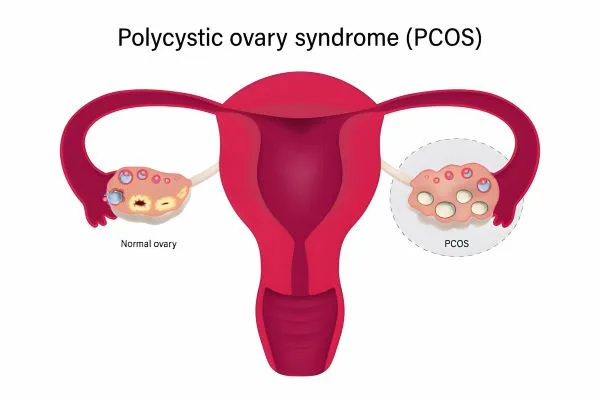Polycystic Ovary Syndrome (PCOS) is a complex condition that affects up to 21% of women in their reproductive years, characterized by symptoms like hirsutism, hyperandrogenism, and sleep disturbances.
With the ongoing quest for effective treatments, the role of nutrients, particularly magnesium, in managing PCOS symptoms has garnered attention.
This blog explores the intriguing connection between magnesium supplements and PCOS, shedding light on a recent scientific study that investigated the effects of magnesium supplementation on PCOS symptoms.
Magnesium Glycinate PCOS Connection: Is It Real?
Magnesium, a pivotal mineral in over 300 enzymatic reactions in the body, including energy metabolism and nucleic acid synthesis, has been suggested to play a beneficial role in alleviating PCOS symptoms.
However, magnesium supplementation, like Magnesium Glycinate, does not significantly impact the measured symptoms of PCOS soley. Neither hyperandrogenism nor hirsutism showed marked improvement, and sleep quality remained unchanged compared to the placebo group.
Magnesium’s beneficial effects on PCOS symptoms might stem from its synergistic action with other vitamins or minerals rather than magnesium alone.
You will also find a similar correlation between creatine and PCOS.
Why Women With PCOS Lack Magnesium? Magnesium For PCOS
Lower levels of serum magnesium have been observed in women with PCOS compared to healthy counterparts, sparking interest in magnesium supplementation as a potential remedy for PCOS-related woes.

- Insulin Resistance: Many women with PCOS have insulin resistance, which can affect the body’s ability to manage magnesium levels effectively. Insulin resistance can lead to increased excretion of magnesium in the urine, lowering magnesium levels in the body.
- Dietary Intake: Women with PCOS may have diets low in magnesium due to various dietary restrictions or preferences. Magnesium is abundant in foods like leafy green vegetables, nuts, seeds, and whole grains. Restrictions or inadequate consumption of these food groups can lead to lower magnesium intake.
- Inflammation: PCOS is often associated with low-grade inflammation, which might affect magnesium status. Inflammation can alter magnesium metabolism and distribution in the body, potentially leading to deficiencies.
- Gastrointestinal Factors: Some women with PCOS may experience gastrointestinal issues that affect nutrient absorption, including magnesium. Conditions such as irritable bowel syndrome (IBS), which can be more common in individuals with PCOS, may impair magnesium absorption.
- Stress and Magnesium Demand: Chronic stress, which can be a factor in PCOS due to hormonal imbalances, increases the body’s demand for magnesium. Magnesium plays a role in the stress response and heightened or prolonged stress can deplete magnesium levels.
Why Women With PCOS Need Magnesium Supplementation?
Women with Polycystic Ovary Syndrome (PCOS) may benefit from magnesium supplementation for several reasons. Magnesium plays a crucial role in various bodily functions that are particularly relevant to the challenges faced by those with PCOS. Here’s why magnesium is important for women with PCOS:
- Insulin Sensitivity: Magnesium is known to influence insulin action and glucose regulation, which is crucial for women with PCOS, many of whom struggle with insulin resistance. Adequate magnesium levels can help improve insulin sensitivity, potentially reducing the risk of developing diabetes and aiding in managing PCOS symptoms.
- Hormonal Balance: Magnesium plays a part in regulating the pituitary gland’s functions, which in turn controls the levels of hormones like LH (Luteinizing Hormone) and FSH (Follicle Stimulating Hormone). Balancing these hormones can help manage PCOS symptoms.
- Inflammation Reduction: Women with PCOS often experience low-grade inflammation, which contributes to insulin resistance and other PCOS symptoms. Magnesium has anti-inflammatory properties that can help reduce this inflammation.
- Stress and Anxiety Management: Many women with PCOS experience increased stress and anxiety levels. Magnesium can act as a natural relaxant, helping to mitigate stress and improve sleep quality, which is often poor in PCOS sufferers.
- Cardiovascular Health: PCOS is associated with an increased risk of cardiovascular diseases. Magnesium supports heart health by regulating blood pressure, heart rhythm, and cholesterol levels.
- Improved Sleep Quality: Sleep disturbances are common in women with PCOS. Magnesium helps regulate melatonin production and supports deep, restorative sleep.
Foods Rich in Magnesium for PCOS Women
Incorporating magnesium-rich foods into the diet can be particularly beneficial for women with PCOS, aiding in managing symptoms related to insulin resistance, inflammation, and hormonal imbalances. Here’s a list of foods high in magnesium that can be a valuable part of a PCOS-friendly diet:

- Dark Leafy Greens: Spinach, Swiss chard, and kale are excellent sources of magnesium. These vegetables are also low in calories and high in fiber, making them ideal for weight management, a common concern for women with PCOS.
- Nuts and Seeds: Almonds, cashews, and pumpkin seeds are magnesium-rich and provide healthy fats and protein. Snacking on a small handful of nuts or adding seeds to salads can boost magnesium intake.
- Legumes: Beans, lentils, and chickpeas are good sources of magnesium, fiber, and protein, supporting blood sugar control and satiety, which can benefit women with PCOS.
- Whole Grains: Quinoa, brown rice, and whole wheat products contain more magnesium than their refined counterparts. They also offer additional nutrients and fiber, which help in managing PCOS symptoms.
- Avocados: Rich in magnesium, healthy fats, and fiber, avocados can support cardiovascular health and weight management, addressing common concerns for women with PCOS.
- Bananas: While known for their potassium content, bananas also provide a decent amount of magnesium. They’re a convenient snack and can help satisfy sweet cravings in a healthier way.
- Dark Chocolate: High in magnesium and antioxidants, dark chocolate (with at least 70% cocoa content) can be a treat that also contributes to magnesium intake. Just be mindful of the portion size.
- Fatty Fish: Salmon, mackerel, and halibut are not only sources of omega-3 fatty acids but also contain magnesium. Including fatty fish in your diet can help manage inflammation and improve heart health.
- Tofu: A great source of magnesium for those following a vegetarian or vegan diet, tofu is also a good source of protein and can be used in various dishes.
- Yogurt: Plain, unsweetened yogurt can provide magnesium and probiotics, which may help improve the gut health of women with PCOS.
You can also try some drinks high in Magnesium to supplement your needs.
Conclusion
The purported connection between magnesium glycinate and PCOS relief is a fascinating exploration of how we understand and address this multifaceted syndrome.
While the allure of a simple solution is undeniable, it’s clear that the journey to managing PCOS symptoms is nuanced and requires a holistic approach. As we peel back layers of anecdotal evidence and scientific study, the importance of comprehensive care tailored to the individual emerges as the true remedy.
Let’s continue to question, research, and share knowledge, ensuring that every woman with PCOS can make informed health decisions.

I am a health and wellness enthusiast working in a Pittsburgh-based wellness clinic. My primary role as a consultant is to tailor a balanced lifestyle for my patients, where positive steps and potent supplements play a synergistic role.


